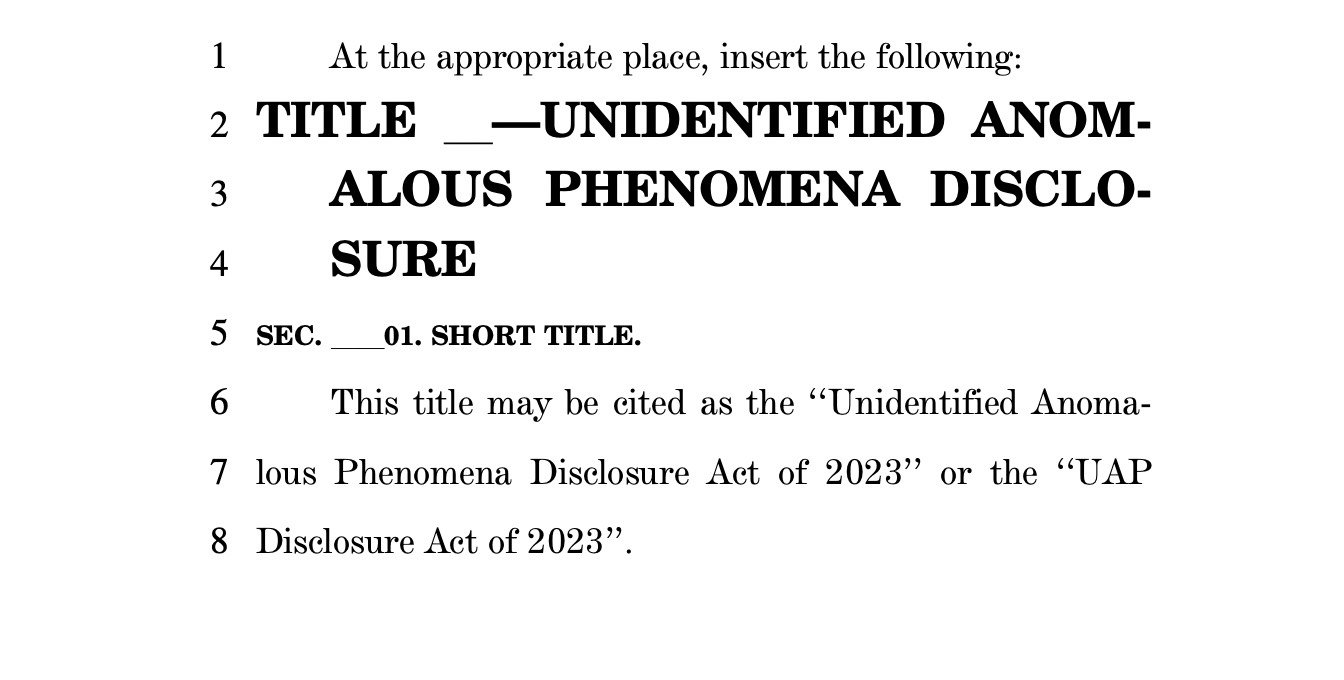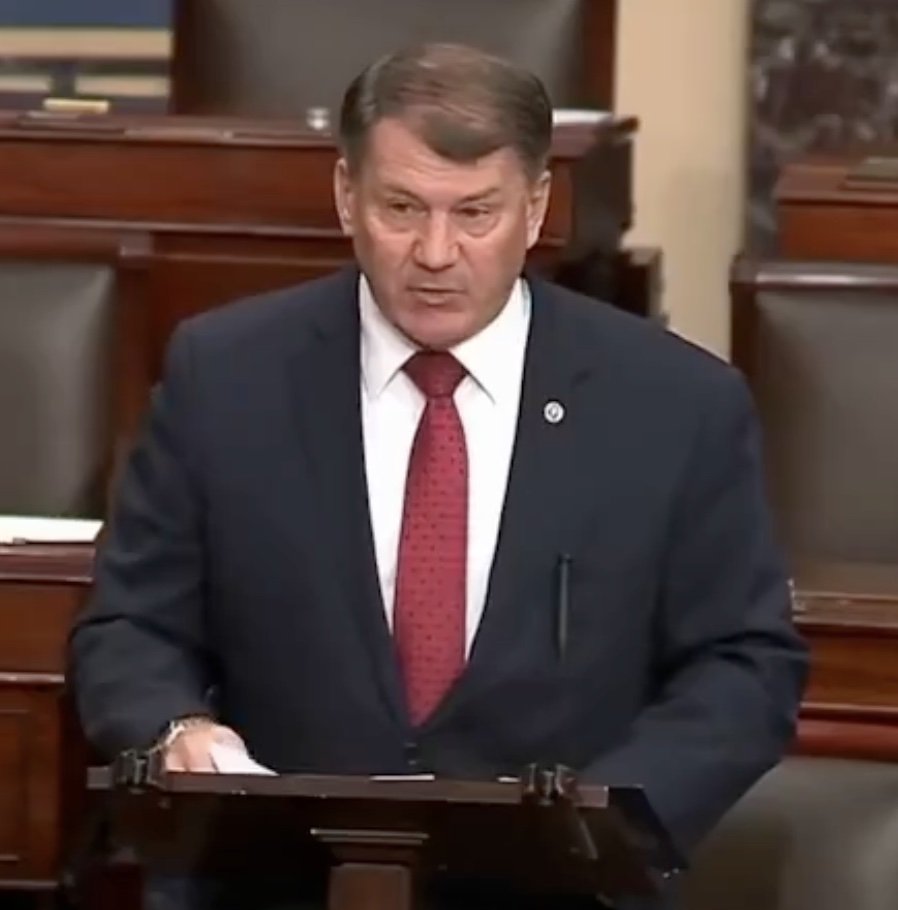

Welcome to this week’s installment of The Intelligence Brief… following a recent clash on Capitol Hill over legislation that would work to release U.S. government records on unidentified anomalous phenomena (UAP), the verdict is in. In our analysis, we’ll be looking at 1) the current state of the NDAA, and the UAP Disclosure Act of 2023, 2) what the two U.S. Senators who put forward the amendment recently said on the Senate floor, and 3) why they are disappointed in the current version of the bill that passed, but also 4) why the efforts for what the original bill sought to accomplish are far from being over.
Quote of the Week
“This is a major win for government transparency on UAPs. And it gives us a strong foundation for more action in the future.”
– Senate Majority Leader Charles Schumer (D-NY)
Latest News: In recent coverage from The Debrief, A government-funded study is looking at warp bubbles as a potential key toward developing faster-than-light communication technology. Elsewhere, scientists may be closing in on the mystery of dark matter, in new research that may link it to the existence of a hypothetical particle. You’ll find links to all our recent stories and other items at the end of this newsletter.
Podcasts: In podcasts from The Debrief, this week on The Debrief Weekly Report, MJ Banias and Stephanie Gerk dive into the Devil’s Church cave in Finland, what may have killed the dinosaurs, and a new fusion reactor in Japan. Elsewhere, on the most recent episode of The Micah Hanks Program, we look at one of the most important military UAP cases of all time. You can get all of The Debrief’s podcasts by heading over to our Podcasts Page.
Video News: This week on Rebelliously Curious, Chrissy Newton is joined by Sarah Porter, the head of the Kyl Center for Water Policy at Arizona State University, who examines the advantages and disadvantages of plans to combat water shortages in the Southwest. Also, be sure to check out the latest episode of Ask Dr. Chance, and all the other great content from The Debrief on our official YouTube Channel.
With that all behind us, it’s now time to look at the latest developments involving the embattled UAP Disclosure Act, and what elected officials are saying in the aftermath of a historic showdown related to U.S. government transparency.
The UAP Disclosure Act: Drama on Capitol Hill
Earlier this year, a 64-page proposal to bring about the disclosure of information on what the U.S. government calls unidentified anomalous phenomena (UAP) was introduced by Senate Majority Leader Chuck Schumer (D-NY) and Senator Mike Rounds (R-SD). Appropriately named the Unidentified Anomalous Phenomena Disclosure Act of 2023 (UAPDA), the proposal was based on an earlier law from 1992, which outlined the disclosure of records related to the JFK assassination in 1963.
Among the key components included in the legislation, introduced as part of the National Defense Authorization Act (NDAA), has been a provision concerning eminent domain, whereby the U.S. government could effectively confiscate and appropriate any UAP technologies that are revealed to exist, as well as the creation of a presidential records review board similar to the one outlined in the 1992 law.


The Senate version of the bill was approved in an 86-11 vote over the summer, following a House vote that approved its version by a 219-210 vote. After each version of the bill was passed, the two chambers entered a formal conference process to negotiate between the two versions of the bill.
Unfortunately, efforts to eliminate or significantly change the wording in the UAP Disclosure Act arose amidst negotiations during the NDAA conference, which were apparently successful. The bill, albeit somewhat weakened, nonetheless made its way into the final version of the NDAA, which the Senate voted to pass on Wednesday, thereby authorizing $886 billion in national defense funding.
So where does that leave the UAP Disclosure Act? Here’s a blow-by-blow of what its co-sponsors had to say about the matter to their Senate colleagues earlier this week.
The Senators Speak
During a session earlier this week, Senate Majority Leader Chuck Schumer and his co-sponsor Mike Rounds took to the floor to address the bill they introduced, as well as changes that were made to it.
Schumer, speaking on Wednesday, said that UAP “are of immense interest and curiosity to the American people,” adding that “with that curiosity comes the risk for confusion, disinformation and mistrust, especially if the government is independent isn’t prepared to be transparent.”
“The United States government has gathered a great deal of information about UAPs over many decades but has refused to share it with the American people. That is wrong. And additionally, it breeds mistrust.”


Referencing testimony provided from what he characterized as “multiple credible sources that information on UAPs has also been withheld from Congress,” Schumer went on to emphasize that the UAP Disclosure Act “offered a commonsense solution” modeled after the JFK Assassination Records Collection Act.
“It brings together I think, a notable parallel in the withholding of information that the that about items that are in the government’s possession, regarding in this particular case, the assassination of President John F. Kennedy,” Rounds added.
“That same approach by government, in terms of the possible withholding of information brings more questions and more attention to the issue of the assassination. We wanted to take that same approach with regard to how we could dispel myths misinformation, about UAPs,” Rounds said.
“Beyond Disappointing”
“It’s beyond disappointing that the House has refused to work with us on all the important elements of the UAP Disclosure Act during the NDAA conference,” Schumer said. “But nevertheless, we did make important progress. For the first for the first time the national archives will gather records from across the federal government on UAPs and have a legal mandate to release those records to the public if appropriate.”
“This is a major major win for government transparency on UAPs. And it gives us a strong foundation for more action in the future,” Schumer added.
Rounds also emphasized the elements that he identified as “shortcomings of the conference committee agreement,” which include “the rejection, first of all, of a government wide review board composed of experts citizens, presidentially appointed and Senate confirmed to control the process of reviewing the records and recommending to the President, what records should be released immediately or postponed, and a requirement as a transparency measure for the government to obtain any recovered UAP material or biological remains that may have been provided to private entities in the past, and thereby hidden from Congress and the American people.”
“We are lacking oversight opportunities,” Rounds said of the exclusion of these provisions in the version of the bill that passed, “and we are not fulfilling our responsibilities.”
Speaking again after Rounds, Schumer added that “We keep working on our proposal to create an independent, presidentially appointed review board that can oversee UAP classified records, and create a system for releasing them more appropriate to the public,” adding that current provisions in the bill “will be largely up to the same entities that have blocked up this gate of their disclosure for decades.”
More Work to Be Done for UAP Disclosure
“We will keep working,” Schumer said, “I want to assure the American people [that] Senator Rounds and I will keep working to change the status quo.”


“To those who think that the citizen review board that would have been created in our UAP Disclosure Act—that it would be unprecedented and somehow would go too far—we note that the proposed review board was very closely modeled on the review board established in the JFK assassination Records Act of 1992,” Rounds added, “which has successfully guided the release of records to the American public on another very sensitive matter of high interest to the American people.”
“We encourage our colleagues to join us in the further investigation of this issue,” Schumer said in conclusion, “and in advancing legislation that will complete what we have accomplished in this NDAA.”
That concludes this week’s installment of The Intelligence Brief. You can read past editions of The Intelligence Brief at our website, or if you found this installment online, don’t forget to subscribe and get future email editions from us here. Also, if you have a tip or other information you’d like to send along directly to me, you can email me at micah [@] thedebrief [dot] org, or Tweet at me @MicahHanks.


Here are the top stories we’re covering right now…
-
- Government-Funded Study Explores Warp Drives as Means of Faster-Than-Light Communication through “Hyperwaves”
This government funded faster-than-light communication research using warp bubbles may be a key to develop FTL travel technology.
- All Habitable Worlds Come to an End
How many tragedies of alien civilizations on habitable worlds have we missed over the 13.8 billion years that elapsed since the Big Bang?
- Has Dark Matter’s Identity Been Revealed? Scientists Searching for Mysterious Hypothetical Particle May Soon Have an Answer
Scientists may be closing in on the mystery of dark matter, in new research that may link it to the existence of a hypothetical particle.
- DOE Backs New Inertial Fusion Energy Research Initiative at New York’s Laboratory for Laser Energetics
The U.S. Department of Energy (DOE) has awarded $10 million to the Laboratory for Laser Energetics (LLE) at the University of Rochester as part of an initiative to stimulate research into inertial fusion energy (IFE).
- Physicists Hope to Finally Resolve Whether Gravity is Quantum by Levitating Micro Diamonds
New experiments to determine whether or not gravity is quantum in nature will involve levitating micro diamonds in a vacuum.
- 1000-Year-Old Artifact Unearthed in Odd Location 1600 Miles from Its Place of Origin
The discovery of an unusual artifact in Norway’s mountainous Vestre Slidre municipality is prompting investigations by archaeologists.
- Entanglement On-Demand Achieved in Breakthrough Study Pointing to “New Frontier” in Quantum Science
Physicists at Princeton University have reported the successful on-demand entanglement of individual molecules, according to new research.
- Unknown Mission of Pentagon’s Mysterious X-37B Spacecraft to Resume, Amidst Setbacks and Speculations
The X-37B spaceplane is set to resume one of the U.S. military’s most mysterious space missions, amidst setbacks over the weekend that pushed the spacecraft’s launch forward another day to Monday.
- Soft Morphing Aerial Robots Could Revolutionize Space Exploration, Starting with Saturn’s Moon Titan
Soft morphing aerial robots could revolutionize space exploration by overcoming complex terrains, starting with Titan.
- Scientists Build Organic Solar Cells Using Wood for Greener Solar Panels
Researchers have utilized lignin, an organic material derived from wood, to improve the stability and environmental friendliness of organic solar cells.
- Generative AI Chatbots Can Already Match Our Capabilities in This Key Area of Human Intelligence, Studies Reveal
New studies show Generative Artificial Intelligence, like ChatGPT-4, achieving human-level creativity, challenging traditional views
- The First and Only Exomoons Ever Discovered Orbiting Distant Planets May Be Something Else Entirely
Astronomers studying the first and only two exomoons ever discovered outside our solar system say deeper investigations now reveal they don’t exist.
- ‘Invisibility Coat’ That Hides Humans from AI Security Cameras Developed by Chinese Students
Chinese graduate students have developed a cost-effective ‘invisibility coat’ capable of concealing the human body from AI-monitored security cameras.
- These Strange Fossils, Once Believed to be Plants, Were Finally Identified. They Aren’t What Experts Thought They Were.
A curiosity found within a trove of ancient plant fossils from the Cretaceous period has been revealed to be something else entirely.
- The Pentagon Rises to New Indo-Pacific Challenges
This week’s newsletter examines how the U.S. has worked to advance its posture in the Indo-Pacific amidst international challenges in 2023.
- A $5 Billion Plan to Address Southwest Water Shortages
This week, Sarah Porter sheds light on the water issues in the Southwest, providing valuable perspectives on the matter.
- The Minot Air Force Base UFO Incident
This week on The Micah Hanks Program, we take a deep dive into the Minot Air Force Base UFO incident of 1968.
- A Celestial Object “Too Large to Exist” Has Been Detected by Astronomers, Upending Past Theories on Planetary Formation
Researchers say the discovery of a planet too large for its nearest star is challenging existing theories about planetary and solar system formation.
- Breakthrough Reveals Flaws in Diamonds Could Lead to Nanoscale Magnetic and Thermal Sensors
A breakthrough that could lead to sensitive new quantum sensors has been achieved by exploiting tiny flaws in diamond fragments.
- Compact Particle Accelerator Can Produce 10 Billion Electron Volt Beam in “Major Energy Milestone”
An international collaboration has successfully demonstrated a compact particle accelerator capable of generating a 10 billion electron volt (10GeV) beam.
- Government-Funded Study Explores Warp Drives as Means of Faster-Than-Light Communication through “Hyperwaves”
